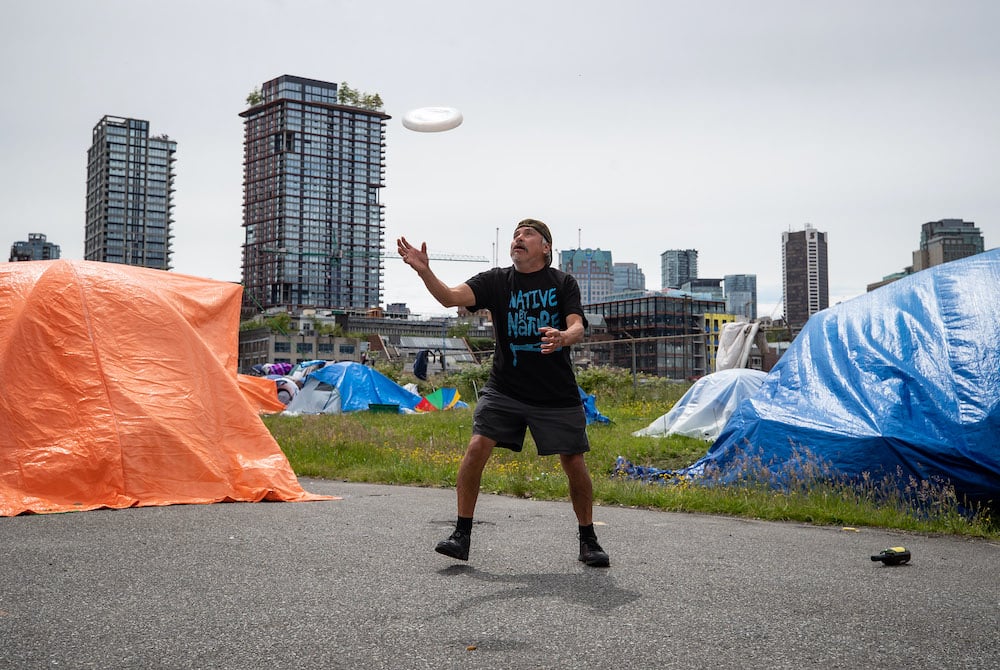On July 14, the Vancouver Park Board approved new bylaws that will allow homeless people to camp overnight in some parts of city parks, so long as they clear out every morning. The board recognized that its current bylaws, which ban camping in parks, are unconstitutional and must change.
These new bylaws basically reflect the board’s current practice. They do the bare minimum to comply with recent judicial rulings, which have proven inadequate to address the intersecting crises of homelessness, overdoses and now COVID-19.
Those rulings have upheld municipal bylaws that allow homeless people to camp in public parks overnight while clearing them out during the day. At the same time, the courts have recognized the harms of continual displacement, which breaks unhoused people’s connections with family, friends and services, impairs their mental and physical health, increases their risk of overdose death and pushes them to isolated locations in what one judge called “a relentless series of daily moves.”
The courts have also recognized that 24-7 shelter is essential for homeless people’s well-being and that many unhoused citizens cannot practically accept housing offered to them due to restrictions on partners, pets, guests, belongings or substance use. Even when governments make efforts to house campers, they know that clearing encampments inevitably leaves some people with nowhere to go.
Meanwhile, homeless encampments provide benefits to unhoused citizens, including stability, safety, autonomy, community, harm reduction, access to services, and somewhere to store belongings. With appropriate supports from government and community agencies, camps can deliver these benefits while mitigating problems like fire, crime, overdose, sharps and waste.
By perpetuating the cycle of daily displacement, laws like Vancouver’s prioritize housed citizens’ recreation over unhoused citizens’ survival. For opponents of homeless campers, parks are communal backyards that are crucial for housed citizens’ mental and physical health. But being deprived of a backyard does not compare with being deprived of a roof over your head or being forced to pack up and move your home every morning.
Vancouver’s new bylaws were pushed through without consulting the people they will police. Individuals experiencing homelessness — who should be recognized as experts in the subject — were not consulted. Nor were Indigenous organizations.
Public input was limited to emailed and live presentations to a virtual meeting held just a week after the draft bylaws were released, in the middle of a pandemic that exacerbated existing obstacles to unhoused people’s participation. This process flouted the Park Board’s commitment to reconciliation with Indigenous peoples, including the nations on whose unceded lands the parks sit.
Moreover, the new bylaws exacerbate the risk of COVID-19 for housed and unhoused citizens alike. According to the U.S. and B.C. Centres for Disease Control, clearing homeless camps can disperse homeless people throughout the community and break connections with service providers, increasing the potential for COVID-19 spread. Leaving them in place, by contrast, facilitates testing, contact tracing and service delivery.
These agencies have urged governments to allow homeless encampments to remain during the pandemic if housing is not immediately available, and to co-operate to implement COVID-19 precautions in camps. Why a government would enact bylaws mandating daily displacement of homeless campers at this time is hard to understand.
Instead of simply waiting for the constitutional challenge that will be launched sooner or later against the new bylaws, the Park Board should immediately suspend displacement of unhoused campers at least for the duration of the COVID-19 pandemic.
It should consult Indigenous organizations and individuals experiencing homelessness to co-develop a rights-based and trauma-informed policy that recognizes homeless folks’ expertise, First Nations’ authority and the necessity for stable encampments pending eventual resolution of the homelessness crisis.
And it should commit to exercise its power under the new bylaws to designate sites within city parks for continual, 24-7 shelter of unhoused citizens.
The irony of enacting laws that perpetuate a cruel and inhumane policy on Bastille Day, when we celebrate the popular overthrow of an oppressive regime, should not be lost on anyone. Instead of merely making its unconstitutional bylaws minimally compliant, Vancouver should set an example and halt the failed policy of continual forcible displacement of unhoused citizens. ![]()
Read more: Housing, Municipal Politics
















Tyee Commenting Guidelines
Comments that violate guidelines risk being deleted, and violations may result in a temporary or permanent user ban. Maintain the spirit of good conversation to stay in the discussion.
*Please note The Tyee is not a forum for spreading misinformation about COVID-19, denying its existence or minimizing its risk to public health.
Do:
Do not: